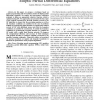Free Online Productivity Tools
i2Speak
i2Symbol
i2OCR
iTex2Img
iWeb2Print
iWeb2Shot
i2Type
iPdf2Split
iPdf2Merge
i2Bopomofo
i2Arabic
i2Style
i2Image
i2PDF
iLatex2Rtf
Sci2ools
116
click to vote
TEC
2008
2008
Genetic Programming Approaches for Solving Elliptic Partial Differential Equations
In this paper, we propose a technique based on genetic programming (GP) for meshfree solution of elliptic partial differential equations. We employ the least-squares collocation principle to define an appropriate objective function, which is optimized using GP. Two approaches are presented for the repair of the symbolic expression for the field variables evolved by the GP algorithm to ensure that the governing equations as well as the boundary conditions are satisfied. In the case of problems defined on geometrically simple domains, we augment the solution evolved by GP with additional terms, such that the boundary conditions are satisfied by construction. To satisfy the boundary conditions for geometrically irregular domains, we combine the GP model with a radial basis function network. We improve the computational efficiency and accuracy of both techniques with gradient boosting, a technique originally developed by the machine learning community. Numerical studies are presented for o...
Appropriate Objective Function | Boundary Conditions | Least-squares Collocation Principle | TEC 2008 |
Related Content
| Added | 15 Dec 2010 |
| Updated | 15 Dec 2010 |
| Type | Journal |
| Year | 2008 |
| Where | TEC |
| Authors | Andras Sobester, Prasanth B. Nair, Andy J. Keane |
Comments (0)

